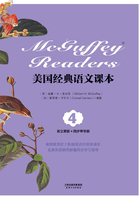
LESSON 14
TRUE MANLINESS (I)
1. “Please, mother, do sit down and let me try my hand, ” said Fred Liscom, a bright, active boy twelve years old. Mrs. Liscom, looking pale and worn, was moving languidly about, trying to clear away the breakfast she had scarcely tasted.
2. She smiled, and said, “You, Fred, you wash dishes? ” “Yes, indeed, mother, ” replied Fred; “I should be a poor scholar if I couldn't, when I've seen you do it so many times. Just try me1.”
3. A look of relief came over his mother's face as she seated herself in her low rocking-chair. Fred washed the dishes, and put them in the closet. He then swept the kitchen, brought up the potatoes from the cellar2 for the dinner and washed them, and then set out for school.
4. Fred's father was away from home, and as there was some cold meat in the pantry, Mrs. Liscom found it an easy task to prepare dinner. Fred hurried home from school, set the table, and again washed the dishes.
5. He kept on in this way for two or three days, till his mother was able to resume her usual work, and he felt amply rewarded when the doctor, who happened in one day, said, “Well, madam, it's my opinion that you would have been very sick if you had not kept quiet3.”
6. The doctor did not know how the “quiet” had been secured, nor how the boy's heart bounded at his words. Fred had given up a great deal of what boys hold dear, for the purpose of helping his mother, coasting4 and skating being just at this time in perfection.
7. Besides this, his temper and his patience had been severely tried. He had been in the habit of going early to school, and staying to play after it was dismissed.
8. The boys missed him, and their curiosity was excited when he would give no other reason for not coming to school earlier, or staying after school, than that he was “wanted at home.” “I'll tell you, ” said Tom Barton,“I'll find him out, boys—see if I don't! ”
9. So he called for Fred to go to school, and on his way to the side door walked lightly and somewhat nearer the kitchen window than was absolutely needful. Looking in, he saw Fred standing at the table with a dishcloth in his hand.
10. Of course he reported this at school, and various were the greetings poor Fred received at recess5. “Well, you're a brave one to stay at home washing dishes.” “Girl boy! ” “Pretty Bessie! ” “Lost your apron, haven't you, Polly! ”
11. Fred was not wanting either in spirit or courage, and he was strongly tempted to resent these insults and to fight some of his tormentors. But his consciousness of right and his love for his mother helped him.
12. While he was struggling for self mastery, his teacher appeared at the door of the schoolhouse. Fred caught his eye, and it seemed to look, if it did not say, “Don't give up! Be really brave! ” He knew the teacher had heard the insulting taunts of his thoughtless schoolmates.
13. The boys received notice during the day that Fred must not be taunted or teased in any manner. They knew that the teacher meant what he said; and so the brave little boy had no farther trouble.
STUDY GUIDE
A. Word Definition
languidly:without strength.
clear away:remove from the table.
scarcely:almost not at all.
scholar:student.
kept on:continued.
amply:enough to give satisfaction.
opinion:personal belief.
secured:achieved.
bounded:jumped with joy.
dear:valuable.
in perfection:at their best.
severely:very.
tried:strained.
habit:routine behavior.
dismissed:allowed to go home.
find him out:discover his secret.
absolutely:completely.
needful:necessary.
wanting:not having enough.
tempted:desiring to do.
resent:to remember with anger.
tormentors:people who tease or insult.
consciousness of:knowledge of what happens in one's own mind.
right:correct actions.
struggling for:trying hard to achieve.
self-mastery:total control over his emotions.
taunts:unkind words.
B. Study Notes
1. “Just try me” is an expression meant to challenge someone to test your abilities or knowledge.
2. Most European homes would have an underground level called the cellar where vegetables and other foods would often be kept. Before refrigeration, keeping such foods in the cold and dark cellar helped them remain in good condition for longer.
3. Generally, “keeping quiet” means not speaking. In this case, the doctor means avoiding hard work and resting often.
4. Coasting: sliding down a snow-covered hill, often on a sled.
5. Recess is a short break often given to school children, usually between morning and lunch time.
C. Comprehension Questions
1. Why did Fred offer to wash the dishes?
2. How did Fred's friends learn about what he was doing at home?
3. Do you think Fred's actions were embarrassing?
4. What do you think the teacher was thinking when he heard the boys teasing Fred?
D. Word Web
What do you think of when you hear the word, “manly”? What qualities or characteristics should a man have? Draw a circle in the center of your page and write the word “manly” inside. Now write some of your ideas about what makes a person “manly” outside of the circle and draw a line to connect each idea to the Manly circle.